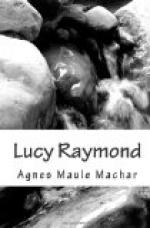But Stella soon roused from her “brown study,” as she called it, by various questions as to Mrs. Harris’s route of travel, and also as to her travelling dress, which Lucy was very ill prepared to answer, having cast hardly a passing glance at it, in her sorrow for her teacher’s departure. On their way home they overtook Mrs. Steele and Alick, to whom were soon related the particulars of their mission, Stella imitating Mrs. Connor’s tone and manner to the life, as she graphically reproduced the conversation, much to Alick’s amusement, though he ground his teeth with indignation on hearing of the violent treatment Nelly had received.
“What a woman! You mustn’t leave the poor child to her tender mercies. What can she turn out, brought up under such a termagant? Suppose I try and bring the old lady round with a little judicious flattery?”
“I think I can manage the matter,” said Mrs. Steele. “I shall make a bargain with Mrs. Connor, and promise to give her a day’s work once a fortnight, provided she will let Nelly come here for half an hour every day. But do you think the child herself will be willing to come?”
“Oh, I’m sure she’ll be willing to come where any one is kind to her, she has so little kindness at home,” replied Lucy.
Mrs. Steele proved right. By her more judicious management and substantial inducement, Mrs. Connor was persuaded to give an ungracious assent to the plan proposed for Nelly’s benefit. But, as if to be as disagreeable as possible, even in consenting, she fixed upon the time which Lucy would least have chosen for the task. The only time when she could spare Nelly, she said, was in the evening, after the children were in bed. It was the time when Lucy most enjoyed being out, watering her flowers, or taking an evening walk, or row with the others. But the choice lay between doing the work then, or not at all; and when she thought how light was the task given her to do, and how slight the sacrifice, she felt ashamed of her inclination to murmur at it.
So Nelly’s education began with the alphabet; and though it was a drudgery both for teacher and pupil, reciprocal kindness and gratitude helped on the task, and before many weeks had passed Nelly was spelling words of two syllables, and had learned some truths, at least, of far greater importance.
VII.
Temptations.
“Or rather help us,
Lord, to choose the good—
To pray for naught,
to seek to none but Thee;
Nor by our ‘daily bread’
mean common food;
Nor say, ‘From
this world’s evil set us free.’”
The Sunday school was again assembled on another Sunday afternoon, some weeks later. The day was even warmer than the one on which our story opened, and all the church windows were opened to their widest extent, to admit every breath of air which came in through the waving pine boughs. Lucy had been promoted to teach a small class of her own, in which Nelly Connor had willingly taken her place. She was indeed advancing faster in spiritual than in secular learning; for in the first she had the best of all teachers, to whose teaching her simple heart was open—the Holy Spirit Himself.




